1127 books for « russell w h »Edit
-
Type
Book (1077)
Music sheets (25)
Photographs (28)
Posters (1)
-
Latest
Last 3 days (9)
Last month (49)
Last week (1)
-
Language
Dutch (1)
English (17)
French (1109)
Russian (4)
-
Century
17th (1)
19th (34)
20th (609)
21st (112)
-
Countries
Belgium (50)
Canada (15)
China (2)
Côte d'Ivoire (2)
Denmark (28)
France (918)
Germany (1)
Italy (10)
Spain (1)
Switzerland (93)
United Kingdom (7)
United States of America (4)
-
Syndicate
ALAC (13)
CLAM (4)
CLAQ (5)
ILAB (552)
NVVA (4)
SLACES (4)
SLAM (476)
SNCAO (2)
Topics
- Age (3)
- Agriculture (2)
- Anarchy (3)
- Andrews russell (11)
- Animals (4)
- Anticipation (4)
- Architecture (9)
- Australia (3)
- Bach j. s. (4)
- Banks russell (24)
- Biography (4)
- Birds (4)
- Canada (4)
- Chemistry (3)
- Children’s books (13)
- China (3)
- Cinema (19)
- Civilisation (4)
- Comic strip (3)
- Contact sports (2)
- Criminology (3)
- Dedication (3)
- Demonology (3)
- Detective novels (9)
- Dictionaries (2)
- Drawings (4)
- Earth (2)
- England (5)
- English (27)
- Ethic (5)
- Fantastic (8)
- Far east (3)
- Fine arts (39)
- First edition (22)
- Fleuve noir (16)
- Geography (7)
- Germanic languages (4)
- Hackney (3)
- History (26)
- Industrial arts & crafts - fine arts (5)
- Jazz (4)
- Literature (48)
- Logic (4)
- Lorenzo (3)
- Medicine (3)
- Memories (3)
- Military arts (3)
- Miller (8)
- Miller russell (15)
- Monographs (3)
- Mountaineering climbing (6)
- Music (4)
- Navy (8)
- Newspaper (3)
- Newspapers press (4)
- Ornithology (2)
- Pacific (3)
- Painters (8)
- Palaeontology (3)
- Parapsychology (2)
- Paris (3)
- Philosophy (83)
- Photography (38)
- Physics (6)
- Policy (7)
- Polynesia (4)
- Posters (6)
- Psychology (17)
- Pyrenees (9)
- Religions (7)
- Review (35)
- Reviews (4)
- Russell (bertrand) (11)
- Science fiction (19)
- Sciences (4)
- Sciences & technique (4)
- Scores (22)
- Simone (4)
- Social sciences (3)
- Sociology (4)
- Songs (22)
- Stannard russell (3)
- Suspense (3)
- Tea (6)
- Theatre (3)
- Translation (4)
- Travel (3)
- United kingdom (4)
- United states (8)
- Various (5)
- Vietnam (9)
- War (3)
- Western (3)
- Williams tennessee (3)
- Zoology (6)
Richard Bach. Photographies de Russell Munson. Préf. de Pierre Clostermann.
Reference : 25076
(1978)
Joanthan Livingston le goéland.
Paris, Flammarion, 1978, in-8, cartonnage éditeur sous jaquette illustrée, 87 pages. Bon état
Robert BENTON and Harvey SCHMIDT. Introduction by Russell LYNES.
Reference : 83984
(1959)
The In and Out Book
New York, The Viking Press, 1959, in-8 à l'italienne (22X18cm), cartonnage éditeur, np. Good condition.
Bonnard Pierre. Gérard Régnier. Textes de Dominique Bozo, John Russell, Jean Clair, Steven A. Nash, Laure de Buzon-Vallet, Claude Laugier, Sasha newman, Antoine Terrasse, Margrit Hahnloser-Ingold, Jean-François Chevrier.
Reference : 15607
(1984)
Bonnard. Cat. expo. Centre Georges Pompidou. EDITION BROCHEE.
Paris, 1984, in-4 carré, broché, 289 pages. Bon état.
Admirable BERGMAN. Photographies de la Collection Kobal.
Ramsay Paris 1984 Grand in-8 ( 285 X 220 mm ) de 127 pages, cartonnage éditeur pleine percaline noire titrée au dos et premier plat en argent jaquette noire et portrait photo 127 pages importante iconographie en noir. Etat de neuf.
The Principles of Mathematics. Vol I (all). - [""RUSSELL'S PARADOX""]
Cambridge, at the University Press, 1903. Royal 8vo. Original blue full cloth binding, all edges uncut. Capitals and upper front hinge with a bit of wear and corners a little bumped. But otherwise a very nice copy. Internally fresh and clean. XXIX, (1), 534 pp.
The uncommon first edition of Russell's landmark work in mathematical logic, in which theory of logicism is put forth and in which Russell introduces that which is now known as ""Russell's Paradox"". The work constitutes the forerunner of Russell and Whitehead's monumental ""Principia Mathematica"", and it seminally influenced logical thought and theories of the foundations of mathematics at this most crucial time for the development of modern mathematical and philosophical logic.""The present work has two main objects. One of these, the proof that all pure mathematics deals exclusively with concepts definable in terms of a very small number of fundamental logical concepts, and that its propositions are deducible from a very small number of fundamental logical principles, is undertaken in Parts II. - VI. Of this Volume, and will be established by strict symbolic reasoning in Volume II. ... The other object of the work, which occupies Part I., is the explanation of the fundamental concepts which mathematics accepts as indefinable. ..."" (Russell, Preface, p. (III)).At the age of 27, in 1898, Russell began working on the book that became ""The Principles of Mathematics"". He originally set out to investigate the contradiction that is inherent in the nature of number, and he originally imagined doing this from a Hegelian standpoint. However, after having read Whitehead's ""Universal Algebra"", Russell gave up his Hegelian approach and began working on a book that was to be entitled ""An Analysis of Mathematical Reasoning"". This book never appeared, as he gave it up in 1900, but much of it is what lies at the foundation of ""The Principles of Mathematics"". After having attended a congress in Paris in 1899, where Peano was present, Russell began rewriting large parts of the work, now with the aim of proving that all of mathematics could be reduced to a few logical concepts, that that which is called mathematics is in reality nothing but later deductions from logical premises. And thus he had developed his landmark thesis that mathematics and logic are identical;"" a thesis that came to have a profound influence on logic and the foundations of mathematics throughout the 20th century.Since the congress, Russell had worked with the greatest of enthusiasm, and he finished the manuscript on the 31st of December 1900. However, in the spring of 1901, he discovered """"The Contradiction"""", or as it is now called, """"Russell's Paradox"""". Russell had been studying Cantor's proof, and in his own words, the paradox emerged thus: """"Before taking leave of fundamental questions, it is necessary to examine more in detail the singular contradiction, already mentioned, with regard to predicates not predictable of themselves. Before attempting to solve this puzzle, it will be well to make some deductions connected with it, and to state it in various different forms. I may mention that I was led to endeavour to reconcile Cantor's proof that there can be no greatest cardinal number with the very plausible supposition that the class of all termes (which we have seen to be essential to all formal propositions) has necessarily the greatest possible number of members."""" (p. 101). The class of all classes that are not members of themselves, is this class a member of itself or not? The question was unanswerable (if it is, then it isn't, and if it isn't, then it is) and thus a paradox, and not just any paradox, this was a paradox of the greatest importance. Since, when using classical logic, all sentences are entailed by contradiction, this discovery naturally sparked a huge number of works within logic, set theory, foundations of mathematics, philosophy of mathematics, etc. Russell's own solution to the problem was his """"theory of types"""", also developed in 1903.In December 1902 Russell had come to the point where he could write a preface, and the book finally appeared in May 1903. It was printed in merely 1.000 copies, and although it was well received, it was not a bestseller at its appearance. By 1909 the last copies of the first run were at the bookbinders. However, the book did play an enormous role in the development of mathematical and philosophical logic as well as the foundation of mathematics throughout the 20th century. Wittgentein's immense interest in the philosophy of logic stems from his reading of the present work and from Frege's """"Foundations of Arithmetic"""", and no logician could neglect the impact of this seminal work, which still counts as one of the most important philosophical and logical works of the 20th century. The book also played an important part in spreading the works of Cantor and Frege to the English-speaking world. In 1903 the Spectator wrote """"we should say that Mr. Russell has an inherited place in literature or statesmanship waiting for him if he will condescend to come down to the common day."""" Shearman's review in Mind hailed it as the most important work since Boole's """"Laws of Thought"""". """"Bertrand Arthur William Russell (b.1872 - d.1970) was a British philosopher, logician, essayist, and social critic, best known for his work in mathematical logic and analytic philosophy. His most influential contributions include his defense of logicism (the view that mathematics is in some important sense reducible to logic), and his theories of definite descriptions and logical atomism. Along with G.E. Moore, Russell is generally recognized as one of the founders of analytic philosophy. Along with Kurt Gödel, he is also regularly credited with being one of the two most important logicians of the twentieth century."""" (Stanford Encyclopedia of Philosophy).Russell had actually planned to write a second volume of the work, but as the contents of this further development would overlap considerably with the further research that Whitehead had undertaken after his """"Universal Algebra"""", which he also planned two write a second volume of, the two great logicians decided to collaborate on that which became the """"Principia Mathematica"""", which appeared 1910-13.
Obituary: Ludwig Wittgenstein. - [RUSSELL'S OBITUARY OF WITTGENTSTEIN]
Edinburgh, Thomas Nelson & Sons, 1951. 8vo. In the original printed wrappers. In ""Mind. A Quarterly Journal"", Vol. LX, No. 239, July, 1951. With some nicks to margins of wrappers, internally very fine and clean. Pp. 297-8. [Entire issue: (2), 297-440, (2) pp.].
First printing of Russell's obituary of Wittgentstein. Russell described him as ""the most perfect example I have ever known of genius as traditionally conceived, passionate, profound, intense, and dominating"".The two meet in 1910 at the University of Cambridge where Russell was approached by the Austrian engineering student Ludwig Wittgenstein, who became his PhD student. Russell viewed Wittgenstein as a genius and a successor who would continue his work on logic. He spent hours dealing with Wittgenstein's various phobias and his frequent bouts of despair. This was often a drain on Russell's energy, but Russell continued to be fascinated by him and encouraged his academic development, including the publication of Wittgenstein's Tractatus Logico-Philosophicus in 1922: From the present obituary: ""I naturally lost sight of him during the 1914-1918 war, but I got a letter from him soon after the armistice, written from Monte Casino. He told me that he had been taken prisoner, but fortunately with his manuscript, which was the 'Tractatus'. I pulled strings to get him released by the Italian Government and we met at the Hague, where we discussed 'Tractatus' line by line.
The Prospects of Industrial Civilization.
London, G. Allen & Unwin, (1959). 8vo. Orig. full cloth in orig. dust jacket. Internally fine. 283 pp.
Second edition.Besides his philosophical work - both his in-depth analysis of the logically principles of mathematics and his more popular attempts to make philosophy understandable for a broader audience - Bertrand Russell (1872-1970) was, in his whole life, a dedicated voice about social matters. The present book - written in collaboration with one of Russell's many wives, Dora Russell (1894-1986) - is an example of this engagement, being printed first in 1923 and again in 1959. In the Preface Russell writes: ""Especially relevant to the present-day problems is the book's contention that industrial organization, by its nature, gives rise to oligarchy or dictatorship, thus tending to destroy democracy as traditionally understood, and to impose upon the individual pressures and restraints that prevent his full life as a human being, thus leading to trivial pursuits and passivity combined with collective rage and hysteria"".
Manifold and Category - Offprint Reprinted from Philosophy and Phenomenological Research, volume IX, n° 1, Sepetmber 1948 , (about the Russellian Paraxodes of Impredicable)
Philosophy and Phenomenological Research Malicorne sur Sarthe, 72, Pays de la Loire, France 1948 Book condition, Etat : Bon paperback, original editor's yellow printed stapled wrappers, with specific title In-8 1 vol. - 20 pages
1st edition, 1948 Contents, Chapitres : About the so-called Russellian paraxodes of impredicable (Not predicable of one's self), and of the class of all classes that do not contain themselves as their own elements (Bertrand Russell, Principles of Mathematics) - Le paradoxe de Russell, ou antinomie de Russell, est un paradoxe très simple de la théorie des ensembles (Russell lui-même parle de théorie des classes, en un sens équivalent), qui a joué un rôle important dans la formalisation de celle-ci. Il fut découvert par Bertrand Russell vers 1901 et publié en 1903. Il était en fait déjà connu à Göttingen, où il avait été découvert indépendamment par Ernst Zermelo, à la même époque, mais ce dernier ne l'a pas publié. - On peut formuler le paradoxe ainsi : l'ensemble des ensembles n'appartenant pas à eux-mêmes appartient-il à lui-même ? Si on répond oui, alors, comme par définition les membres de cet ensemble n'appartiennent pas à eux-mêmes, il n'appartient pas à lui-même : contradiction. Mais si on répond non, alors il a la propriété requise pour appartenir à lui-même : contradiction à nouveau. On a donc une contradiction dans les deux cas, ce qui rend paradoxale l'existence d'un tel ensemble. (source : Wikipedia) near fine copy , offprint paginated 1 to 20, no markings, paper very lightly yellowing, a rather nice copy
Principia mathematica. Volume I. - [THE BIBLE OF MODERN LOGIC]
Cambridge, 1910. Royal 8vo. In a recent half calf with four raised bands and green leather title-label with gilt lettering to spine. Repair to half title, not affecting text. Title-page with repair to outer margin, not affecting text. Previous-owner's name on whilte paper label pasted on to verso of title-page, not affecting text. Errata-leaf with repairs to lower margin. Otherwise, fine and clean. XIII, (3), 666 pp.
The seminal first edition of the first volume of the landmark work that founded modern mathematical logic and came to define research in the foundations of mathematics throughout the 20th century. ""Principia Mathematica"" proved to be remarkably influential in at least three ways. First, it popularized modern mathematical logic to an extent undreamt of by its authors. By using a notation superior to that used by Frege, Whitehead and Russell managed to convey the remarkable expressive power of modern predicate logic in a way that previous writers had been unable to achieve. Second, by exhibiting so clearly the deductive power of the new logic, Whitehead and Russell were able to show how powerful the idea of a modern formal system could be, thus opening up new work in what soon was to be called metalogic. Third, Principia Mathematica re-affirmed clear and interesting connections between logicism and two of the main branches of traditional philosophy, namely metaphysics and epistemology, thereby initiating new and interesting work in both of these areas.As a result, not only did Principia introduce a wide range of philosophically rich notions (including propositional function, logical construction, and type theory), it also set the stage for the discovery of crucial metatheoretic results (including those of Kurt Gödel, Alonzo Church, Alan Turing and others). Just as importantly, it initiated a tradition of common technical work in fields as diverse as philosophy, mathematics, linguistics, economics and computer science."" (SEP)""""Principia Mathematica"", the landmark work in formal logic written by Alfred North Whitehead and Bertrand Russell, was first published in three volumes in 1910, 1912 and 1913. A second edition appeared in 1925 (Volume 1) and 1927 (Volumes 2 and 3). In 1962 an abbreviated issue (containing only the first 56 chapters) appeared in paperback. In 2011 a digest of the book's main definitions and theorems, originally transcribed by Russell for Rudolf Carnap, was reprinted in The Evolution of Principia Mathematica, edited by Bernard Linsky.Written as a defense of logicism (the thesis that mathematics is in some significant sense reducible to logic), the book was instrumental in developing and popularizing modern mathematical logic. It also served as a major impetus for research in the foundations of mathematics throughout the twentieth century. Along with Aristotle's Organon and Gottlob Frege's Grundgesetze der Arithmetik, it remains one of the most influential books on logic ever written."" (SEP).
SEIZE MILLE LIEUES A TRAVERS L'ASIE ET L'OCEANIE. Voyages exécutés pendant les années 1858-1861. Sibérie, Désert de Gobi, Péking, Fleuve Amour, Japon, Australie, Nouvelle-Zélande, Inde, Himalaya. Tomes 1-2
Paris Librairie de L. Hachette et Cie 1864 in 12 (18,5x12) 2 volumes reliures demi chagrin rouge de l'époque, dos à nerfs ornés de filets dorés, [1] 428 pages avec une carte gravée dépliante, et 427 pages, avec une grande planche gravée dépliante de panorama de l'Himalaya, rousseurs éparses (some moderate foxing). Henry Patrice Marie, Comte Russell-Killough, 1834-1909. Edition originale. Bon exemplaire ( Photographies sur demande / We can send pictures of this book on simple request )
Bon Couverture rigide Ed. originale
Monument Henry Russell. Souvenir du 5 Septembre 1911.
Bergerac, Imprimerie Générale du Sud-Ouest, 1911.
Exemplaire de Mathilde Béraldi, épouse d'Henri Béraldi, avec son ex-libris sur cuir bleu. Béraldi était vice président du Comité du Monument Russell. Madame Béraldi figure dans la liste des souscripteurs en fin d'ouvrage, ainsi que ses fils, André et Pierre, en compagnie naturellement d'Henri. Bel exemplaire. La reliure est signée P. Affolter, un des relieurs habituels des Béraldi. Bel exemplaire. Labarère 1392. Labarère, Henry Russell 60. /// In-8 de portrait, 51 pp. Demi-veau beige. (Reliure de l'époque.) //// /// PLUS DE PHOTOS SUR WWW.LATUDE.NET
( Bandes Dessinées ) - Ray Bradbury - Dave Gibbons - Kent Williams - P.Craig Russell - John van Fleet - Chuck Roblin - Ray Zone - Ralph Reese - Al Williamson.
Reference : 28721
(1993)
The Ray Bradbury Chronicles, Volume 1. ( Tirage spécial à 1200 exemplaires numérotés, signés par Ray Bradbury, Kent Williams, P.Craig Russell, John van Fleet, Chuck Roblin, Ray Zone, Ralph Reese et Al Williamson ).
A Byron Preiss Visual Publications, Inc.Boook 1992. In-4 cartonnage éditeur pleine toile violette non paginé au format 26,5 x 18 cm. Couverture avec titre embossé. Dos carré avec titre. Plats et intérieur frais. Complet de la belle jaquette illustrée par Dave Gibbons. 6 nouvelles de Ray Bradbury adaptées par WKent Williams, P.Craig Russell, John van Fleet, Chuck Roblin, Ray Zone, Ralph Reese, Al Williamson, préfacées par Ray Bradbury. Edition originale en état proche du neuf. Rarissime exemplaire tiré spécialement à 1200 exemplaires numérotés ( n° 273 ), signés par Ray Bradbury, Kent Williams, P.Craig Russell, John van Fleet, Chuck Roblin, Ray Zone, Ralph Reese et Al Williamson.
Site Internet : Http://librairie-victor-sevilla.fr.Vente exclusivement par correspondance. Le libraire ne reçoit, exceptionnellement que sur rendez-vous. Il est préférable de téléphoner avant tout déplacement.Forfait de port pour un livre 7 €, sauf si épaisseur supérieure à 3 cm ou valeur supérieure ou égale à 100 €, dans ce cas expédition obligatoire au tarif Colissimo en vigueur. A partir de 2 livres envoi en colissimo obligatoire. Port à la charge de l'acheteur pour le reste du monde.Les Chèques ne sont plus acceptés.Pour destinations extra-planétaire s'adresser à la NASA.Membre du Syndicat Lusitanien Amateurs Morues
Russell andrews L'affaire gideon France loisirs
2000 2000. Russell Andrews: L'affaire Gideon/ France Loisirs 2000 . Russell Andrews: L'affaire Gideon/ France Loisirs 2000
Très bon état
Belgion (Montgomery) sur Bernard Shaw - André Gide - Sigmund Freud - Bertrand Russell
Reference : 191
(1934)
Notre foi contemporaine - Bernard Shaw - André Gide - Sigmund Freud - Bertrand Russell
Gallimard , Documents Bleus Malicorne sur Sarthe, 72, Pays de la Loire, France 1934 Book condition, Etat : Bon broché, sous couverture imprimée éditeur blanche grand In-8 1 vol. - 312 pages
Contents, Chapitres : 1. Introduction : La question qui se pose - Le propagandiste inconscient - 2. D'après Bernard Shaw : Le socialisme et le surhomme - L'évangile de l'empoigne - Le crime - Le mariage - La force vitale ou l'évolution créatrice - La prétention d'être inspiré - 3. D'après André Gide : Les cas déconcertants - Le maquis épais de l'homme - L'appel au bonheur - Non pas le christianisme mais le Christ - Le bien et le mal - La fatalité - Le corydon - La preuve par expérience - 4. D'après le docteur Sigmund Freud : La naissance des dieux - Morale et désirs - Bonheur et intelligence - Faire face à la réalité - Pourquoi réduire le nombre des règles - 5. D'après le comte Bertrand Russell : Un message - Modification de la nature humaine - La théorie de la connaissance de M. Russell - L'harmonie dans les désirs - 6. Conclusion : Les croyances d'après lesquelles nous agissons - La personnalité - L'éternel devenu temporel - Post-scriptum sur André Gide
HENRY RUSSELL-KILLOUGH, Bio-Bibiographie
2003 Serres-Castet Edition du Gave 2003 Deux volumes grand in-8 broché couv rempliée 218 et 202 pp Avec 81 illustrations et reproductions de documents sur fond teinté. Tirage à 293 exemplaires : 33 ex de tête sur Rivoli blanc de 160 g et 260 ex su Rivoli blanc 120g numéroté. Celui ci n°73 sur Rivoli blanc 120g Conçu comme une suite des Cent Ans aux Pyrénées d'Henri Béraldi et de l'essai de Bibliographie Pyréneiste, cette étude de Jacques Labarère présente sous un jour nouveau la personnalité d'Henry Russell, en corrélation avec son oeuvre imprimée. Fruit de dix ans de patie,tes recherches, de nombreux documents inédits provenant de sources privées enrichissent la biographie d'élément majeurs et fournissent à la bibliographie de précieuses informations. Une partie de ces documents est reproduit dans le texte. Voici restitué presque cent ans après sa mort, un vrai portrait du comte Henry Russell, suivi d'une imposante et complète bibliographie de l'écrivain phare du pyrénéisme. Ouvrage indispensable aux amoureux des pyrénées en général, aux bibliophiles amateurs, libraires et bibliothécaires en particulier aui auront en main un véritable outil de travail, un manuel de référence, un beau livre que le temps rendra précieux. (B. Hauvette) TRES BON ETAT exemplaire non-coupé
Envoi en Mondial Relay pour la France Métropolitaine, l'Allemagne, l'Autriche, Belgique, Espagne, Italie, Luxembourg, Pays-Bas et PortugalPour l'étranger, envoi en tarif "livres et brochures" pour les commandes inférieures à 50 , au dessus en colissimo international.
La route des Indes. Par Russell Miller et les rédacteurs des Éditions Time-Life.
Couverture rigide. Reliure de l'éditeur. 24 x 29 cm. Environ 200 pages.
Livre. Par Russell Miller et les rédacteurs des Éditions Time-Life. Traduit par André Dessens. Editions Time-Life (Collection : La grande aventure de la mer), 1981.
Presley Elvis - Kosloff Ira,Scott Winfield,Mann Kal,Mc Farland J. Leslie,Baum Bernie,Creatore Luigi,Weiss George,Blackwell Otis,Schoeder Aaron,Gold W.,Giant Bill,Peretti Hugo,Lowe Bernie,Kaye Florence,Moody Russell,Glenn Artie,James Mark - Mysels Maurice,Schroeder A.,Mc Farland J. Leslie,Mann Kal,Blackwell Otis,Lowe Bernie,Kaye Florence,Giant Bill,Baum Bernie,Gold W.,Scott Winfield,Moody Russell,Glenn Artie,James Mark,Weiss George,Peretti Hugo,Creatore Luigi
Reference : 95624
(1970)
Partition de la chanson : Elvis Presley Record Breakers greatest Hits " Plus grands succès " d'Elvis Presley : - Can't help falling in love - Suspicious minds - Crying in the chapel - Stuck on you - Wear my ring around your neck - Return to sender - I want you, i need you , i love you - Good luck charm - You're the devil in disguise - Teddy bear
Big 3 Music Corporation 1970 approx.
Bon état Grand format Guitare,Piano
Value of Making. Theory and Practice in Ancient Craft Production
, Brepols, 2021 Paperback, xiv + 254 pages, Size:216 x 280 mm, Illustrations:74 b/w, 46 col., 12 tables b/w., Language: English. ISBN 9782503595191.
Summary This volume presents new scholarship on the value and valuing of craft production in ancient societies around the Mediterranean. Ancient economic history, especially when approached archaeologically, has typically - and with good reason - focused upon the objects that were produced by craftspeople, their form and style, and their distribution. Typological approaches necessary for sorting and analysing large bodies of material evidence have also prioritized the final form of artefacts. Yet it was first and foremost the craftspeople behind these items who were responsible for an item's functionality, its purpose, and its value, and these roles have in recent years received fresh attention in anthropological and sociological studies. The contributions gathered in this volume revolve around the role of makers, their handling of materials, and their place in networks of production and consumption, whilst at the same time remembering that craftspeople were never lone forces but depended on wider networks of supplies, colleagues, and consumers, as well as more ephemeral considerations such as aesthetics and religious value. Through this approach, the volume sheds new light not only on a range of crafts and materials from the ancient world, but also on the value of making and the making of value in ancient Mediterranean societies. TABLE OF CONTENTS List of Illustrations List of Abbreviations 1. Introduction: New Approaches to Old Crafts - HELLE HOCHSCHEID AND BEN RUSSELL I. Communities of Making 2. Craft, Ownership, and Identity: Making, Thinking, and Being (Together) - ANN BRYSBAERT AND HELLE HOCHSCHEID 3. Preparing for War: Craftspeople, Management, and Innovations - NATACHA MASSAR 4. Ancient Maker Spaces: The Value of Craft Communities in Multi-Material Workshops in Late Antiquity - BETH MUNRO II. Craft Organization and Identity 5. Roman Stone Carvers and their Cha ne Op ratoire - BEN RUSSELL 6. Reconstructing Socio-Economic Work Practices between Industries: Cross-Industry Relations in Roman Italy - ELIZABETH A. MURPHY 7. Reeds to Riches: The Crafts of Making Ancient Auloi - DANISE VAN HAL AND HELLE HOCHSCHEID 8. Spinning - The Invisible Profession - MARY HARLOW III. Form, Function and Authenticity 9. Cylinder Seals in the Late Bronze Age Aegean (c. 1600-1100 BC) - GERT JAN VAN WIJNGAARDEN 10. Assessing Value Attribution: The Evidence of Votive Offerings - HEIDE FRIELINGHAUS 11. Precious Pots: Making and Repairing Dolia - CAROLINE CHEUNG 12. Greek and Roman Glyptic: alibi ars, alibi materia - KENNETH LAPATIN IV. Old Crafts for the Future 13. On the Value of Making and Learning - WILL WOOTTON
Multi-Disciplinary Approaches to Medieval Brittany, 450?1200. Connections and Disconnections
, Brepols, 2023 Hardback, xii + 376 pages, Size:156 x 234 mm, Illustrations:7 b/w, 13 col., 2 tables b/w., 17 maps b/w, 3 maps color, Language(s):English, French. ISBN 9782503601106.
Summary While it is well-established that Brittany and the Insular world were closely linked during the medieval period, the precise nature of these connections continues to spark debate. Was there a significant migration in the fifth century, or were the connections more multi-faceted and enduring than medieval accounts suggest? And how might we triangulate the Atlantic connections with other influences on medieval Brittany, including those from the Carolingian world? Drawing together research that was first presented at the conference 'Brittany and the Atlantic Archipelago: Contact, Myth and History 450-1200', held in Cambridge in December 2017, this volume seeks to present new and ground-breaking research into both Brittany and its broader European context during the medieval period. The chapters gathered here range across various disciplines, including textual history, archaeology, hagiography, onomastics, and the study of liturgical evidence, offering new insights into our understanding of medieval Brittany, as well as drawing out particular connections (and disconnections) between Brittany and its neighbours. TABLE OF CONTENTS List of Illustrations Acknowledgements Abbreviations 1. Introduction Caroline Brett, Fiona Edmonds, and Paul Russell 2. The 'Late Roman Military Migration': A Historiographical Myth Patrick Galliou 3. The Settlement of Brittany in Light of a Migration Period Archaeology John Hines 4. The Archaeology of Early Medieval Rural Societies in Brittany ? Settlements, Landscapes, Legacies, and New Influences: Interdisciplinary Research Isabelle Catteddu and Joseph Le Gall 5. Espace et pouvoirs en Bretagne aux premiers si cles du Moyen ge (VIe-IXe si cle) Magali Coumert 6. Alain de Bretagne, l'exil d'un Prince Joelle Quaghebeur 7. Memoria, Memorialization, and the Monks of Mont-Saint-Michel, c. 960-1033 K. S. B. Keats-Rohan 8. Pr sence d'une culture celtique insulaire chez les anciens hagiographes bretons Joseph-Claude Poulin 9. Cross-Channel Intercourse in the Earliest Breton Vitae Karen Jankulak 10. Explaining the Origins of Brittany in the Twelfth Century: St Cadog's Solution Ben Guy 11. Generic Place-Name Elements in the Three Brittonic Regions O.J. Padel 12. Facing Different Ways: the Onomastics of People in Medieval Brittany Paul Russell Index
Wallace Alfred Russell (1823-1913). Darwinism: A Statement on the Theory of Nat
"""Wallace Alfred Russell (1823-1913). Darwinism: A Statement on the Theory of Natural Selection and Some of its Applications In Russian (ask us if in doubt)/Uolles Alfred Rassel (1823-1913). Darvinizm: Izlozhenie teorii estestv. podbora i nekotorykh iz ee prilozheniy. Alfred Roussel Wallace; Translated and Prepared by Prof. M. A. Menzbir with its appendix: Alfred Roussel Wallace and its Scientific Meaning 2nd ed. Suppl.-Series of Biology Textbooks; 15 Moscow: M. and S. Sabashnikov 1911.XXVI 577 p. SKUalba722e81405378960."""
Charles Russel et l'art " Western ".
Chêne, 1975. In-4 br. à l'italienne. Traduit par B. Marret. Préface de V. A. Paladin. Ouvrage concu et réalisé par L. Aldrich. Nombreuses reproductions en couleurs de tableaux de Charles Russell. E.O.
Histoire d'un c?ur
Reliure demi-chagrin cerise moderne. Dos lisse, avec titre et mention d'auteur dorés. Date dorée au talon. Reliure remarquable. Couverture et dos conservés en excellent état. Pages non-ébarbées. Très belle fraîcheur du papier. Frontispice en noir et blanc avec fac-similé de la signature de l'auteur. Bel état du contenu orné de culs-de-lampe en noir et blanc et de photographies en noir et blanc in-texte. Signet en tissu rouge rattaché au livre. Exemplaire comme neuf avec document de souscription à la fin.
Biarritz. Les Amis du Livre Pyrénéen. 2007. 321 pp. In-8. Relié. Etat de neuf. 1 volume. Nouvelle édition, précédée d'un Avant-propos de Marie POMYERS-GOUYON, arrière-petite-nièce de RUSSELL.Edition récente dans une superbe reliure de l'?uvre d'Henry Russell. Ce pyrénéiste franco-britannique du XIXe s'est servi de ce livre comme d'un médium pour faire partager sa passion des Pyrénées. L'histoire d'un c?ur vibrant au rythme de la vie dans la région.
Deux semaines dans les Pyrénées.
Reliure demi-chagrin rouge moderne. Dos lisse, avec titre et mention d'auteur dorés. Date dorée au talon. Reliure remarquable. Couverture et dos conservés en excellent état. Très belle fraîcheur du papier. Frontispice en noir et blanc avec fac-similé de la signature de l'auteur. Excellent état du contenu. Signet en tissu rouge rattaché au livre. Exemplaire comme neuf avec document de souscription à la fin.
Biarritz. Les Amis du Livre Pyrénéen. 2009. XVIII-125 pp. In-8. Relié. Etat de neuf. 1 volume. TIRAGE LIMITÉ. Un des 188 exemplaires numérotés sur vélin blanc Rivoli 120g.Traduction française établie d'après l'édition originale de 1868 par Yann Gouyon. Traduction française de A Fortnight in the Pyrenees(Pau, 1868).Avant-propos de Marie de POMYERS6GOUYON (pp. V-VII), petite-nièce d'Henry RUSSELL-KILLOUGH ; et Présentation par J. LABARÈRE (pp. IX-XVIII).Edition récente dans une superbe reliure de l'?uvre d'Henry Russell. Ce pyrénéiste franco-britannique du XIXe s'est servi de ce livre comme d'un médium pour faire partager sa passion des Pyrénées. Cette édition contient un Index alphabétique des noms de lieux et de personnes, établi par J. LABARÈRE, beaucoup plus complet que celui de l'édition originale
Conquête (La) du bonheur. Traduit de l’anglais par N. Rabinot.
Paris, Payot (Bibliothèque Scientifique), 1949 ; in-8, broché ; 156, (2) pp. de catalogue de l’éditeur.
Une photographie extraite d'un journal a été collée en dessous de la préface de Bertrand Russell. Exemplaire en bel état.


Phone number : 06 60 22 21 35
SOUVENIRS D'UN MONTAGNARD (1858-1888), PAR LE COMTE HENRY RUSSELL, MEMBRE DES SOCIETES GEOGRAPHIQUE ET GEOLOGIQUE DE FRANCE, DES CLUBS ALPINS DE FRANCE ET D'ANGLETERRE, MEMBRE HONORAIRE DE LA SOCIETE D'ETUDES DU COMMINGES, MEMBRE TITULAIRE DE LA SOCIETE GEOGRAPHIQUE DE TOULOUSE, AUTEUR DE «SEIZE MILLE LIEUES A TRAVERS L'ASIE ET L'OCEANIE».
PAU. IMPRIMERIE VIGNANCOUR. 1888. IN-12 (13,5 X 19 X 3 CENTIMETRES ENVIRON) DE XX + 508 PAGES, RELIURE MODERNE 1/2 CHAGRIN ROUGE, DOS A QUATRE NERFS, TITRE DORE. «RARE ET TRES RECHERCHE. SECONDE EDITION, MAIS PREMIERE A ETRE MISE DANS LE COMMERCE... LE PLUS CELEBRE DES OUVRAGES PYRENEISTES... LE TEXTE DE L'EDITION DE 1878 EST ICI TRES REMANIE ET AUGMENTE... RAPPELONS QUE L'AUTEUR, PEU SATISFAIT DE LA PRESENTATION QU'IL AVAIT DONNE A SES ECRITS, N'A JAMAIS CONSIDERE L'EDITION DE 1878 COMME UNE PREMIERE EDITION, MAIS COMME UN ESSAI, UNE EDITION PREORIGINALE EN QUELQUE SORTE. DANS TOUTE SA CORRESPONDANCE IL CITE L'EDITION DE 1888 COMME ETANT LA PREMIERE...» (LABARERE. 1341 ET 1360). ENRICHI D’UN ENVOI AUTOGRAPHE SIGNE DE RUSSELL A PAUL TURON. EX-LIBRIS MANUSCRIT SUR LE FEUILLET DE TITRE. PETITS DEFAUTS EXTERIEURS, LEGERES ROUSSEURS SUR QUELQUES PAGES, SINON BEL EXEMPLAIRE.
 Write to the booksellers
Write to the booksellers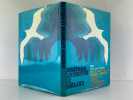
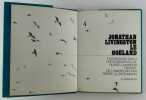
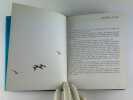
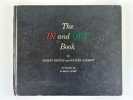
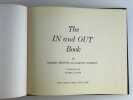
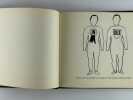
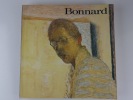
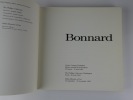
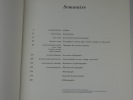

![The Principles of Mathematics. Vol I (all). - [""RUSSELL'S PARADOX""]. "RUSSELL, BERTRAND.](https://static.livre-rare-book.com/pictures/LLX/60086_1_thumb.jpg)
![The Principles of Mathematics. Vol I (all). - [""RUSSELL'S PARADOX""]. "RUSSELL, BERTRAND.](https://static.livre-rare-book.com/pictures/LLX/60086_2_thumb.jpg)
![The Principles of Mathematics. Vol I (all). - [""RUSSELL'S PARADOX""]. "RUSSELL, BERTRAND.](https://static.livre-rare-book.com/pictures/LLX/60086_3_thumb.jpg)
![Principia mathematica. Volume I. - [THE BIBLE OF MODERN LOGIC]. "WHITEHEAD, ALFRED NORTH & BERTRAND RUSSELL.](https://static.livre-rare-book.com/pictures/LLX/55204_1_thumb.jpg)
![Principia mathematica. Volume I. - [THE BIBLE OF MODERN LOGIC]. "WHITEHEAD, ALFRED NORTH & BERTRAND RUSSELL.](https://static.livre-rare-book.com/pictures/LLX/55204_2_thumb.jpg)
![Principia mathematica. Volume I. - [THE BIBLE OF MODERN LOGIC]. "WHITEHEAD, ALFRED NORTH & BERTRAND RUSSELL.](https://static.livre-rare-book.com/pictures/LLX/55204_3_thumb.jpg)
![Monument Henry Russell. Souvenir du 5 Septembre 1911.. RUSSELL, Henry, [BERALDI]](https://static.livre-rare-book.com/pictures/HUG/15864_1_thumb.jpg)
![Monument Henry Russell. Souvenir du 5 Septembre 1911.. RUSSELL, Henry, [BERALDI]](https://static.livre-rare-book.com/pictures/HUG/15864_2_thumb.jpg)
![Monument Henry Russell. Souvenir du 5 Septembre 1911.. RUSSELL, Henry, [BERALDI]](https://static.livre-rare-book.com/pictures/HUG/15864_3_thumb.jpg)




![HENRY RUSSELL-KILLOUGH, Bio-Bibiographie. [Pyrénées] LABARERE Jacques - [Russell-Killough Henry]](https://static.livre-rare-book.com/pictures/RLI/21_1_thumb.jpg)







